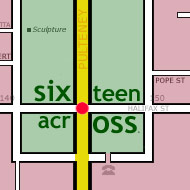16 across
The side of the fountain is wide enough for one, so Theda sits down with rolled trousers and pushed-off sandals to edge her feet into the water. It's hot at the surface, and cool underneath. Ants march in parallel lines toward an ice-cream cone melting slowly beside her. An empty can floats past, and she kicks it away.
The world spreads out from here, arranged in pairs. Schoolchildren hold hands; workmates sit down for a late lunch on the grass, stealing lettuce from a shared sandwich; two boys stumble off a bus in the distance, tethered to each other by an mp3 player, one earpiece each, the cord tightening as they move apart and then wrenching them back together. Theda looks away and breathes slowly, stretching her feet (two of them) and bringing them up to the surface of the water. Beyond the ends of her toes the fountain is home to statues: metallic women, each one reaching out with a long-necked bird in her hands.
The public toilets are paired as well; one for men, one for women. Cars pull up next to each other at traffic lights. Small green WALK silhouettes cohabit with DON'T WALK, unwilling to break free. Bus stops mirror each other grotesquely from opposite sides of their roads; you like the 173—I like the 173 too! Oh yeah, definitely, the 99B as well. There's nothing unpaired in the world, Theda thinks, except her and the statue of Queen Victoria, glaring out at the coupled world in queasy distaste.
The floating can bobs back with a bottle in front of it. Theda pulls them both out and stands up, looking around for a bin. She finds two. Tunk, the bottle goes when she drops it into one; she hesitates, and then keeps the can.
The footpath's hot, and she tiptoes in her own wet footprints on the way back to the fountain. As she sits down again she drops the can back in to float, confused, on its own. It isn�t as satisfying as she'd hoped: it disappears behind fountain jets quickly enough, and the rest of the world is still paired. Two flagpoles, two flags that stir in the wind for a moment and then collapse again, two trams in the distance, two clock towers behind her backing each other up sycophantically on the time. She leans forward to let her stomach settle, and splashes her face. Water runs down her nose, and the world narrows to reflections and shadows and the continuous splash of the fountain.
The wind comes back, and for a moment it's almost cold. Spray lands on the back of her shoulders. It happens again a few seconds later, and then again, and then it's rain: when she sits up and opens her eyes, the pavers around her are bright, sunlight shining off the raindrops, reflecting them into silver, and the ground into the distance is like the bottom of a wishing well. The ants on the fountain-edge disperse toward cracks, their ordered rows soluble in water. The ice-cream dissolves too, threads of yellow flooding outward into raindrops.
A woman with a clumsily navigable stroller pulls a small boy by the hand; they rush for cover beneath awnings, stepping in front of cars and stopping them with a glance, though the boy's already surely wetter than anyone can get from a minute's rain. A pair of seagulls flaps away. The flags grow darker and heavier until they outweigh the wind and fold around their poles. The square empties, breaking down into pairs that scatter toward shelter: the rain breaks up kisses and conversation, turns laughter into shrieks.
Theda watches as the ants are cut off by spreading ice-cream and the square around her empties, scattering outward. Another raindrop lands, and the ants start circling frantically, butting into water and backing away and then trying again. She's shielding them from the rain, but their island shrinks as the water spreads; their circling becomes more urgent, the last paths that they might have followed to safety start to close up.
The rest of the square is empty. Where's everyone gone? Even the traffic's quiet. They must all know something she doesn't, there must be a secret retreat that's closed to the solitary. The ants are shut out as well, helpless without a link to the nest.
Theda pulls her legs out of the fountain and looks through her bag for an old postcard. It takes a while to coax the ants on, and some of them don't make it. A few more fall off as she transfers them to a crack in the ground. They stumble around the edge and finally inside, into somewhere dry.
She doesn't know whether she's helped. Maybe the space is already full of bigger grumpier ants with a link to their nest and a distaste for outsiders. Maybe she should have poked a stick in and wriggled it around and cleared everything out first. It's too late now.
The rain starts thudding harder, bouncing as it lands. Grass is brighter, tree trunks are a rich dark pink instead of grey. Lines and patterns suddenly cut deeper into the bark. Lamp-posts reflect the sky in dozens of mirroring poles. Now that she's standing up Theda can see through windows into coffee-shops: they're filled with steaming mugs and cosy lighting and slightly damp couples, crouched in artificial comfort. It'll still be raining when the shops close, she thinks, and the hot drinks cool down, and the couples dry off or fall apart.
Her postcard's wilted at the edges and the ink is running, words sliding off into illegibility. Into the bin, then, after the bottle she dropped in earlier. She walks out of the square through puddles, and it's almost a shame that it's raining; with her face this wet it's impossible to tell that she hasn't been crying.
